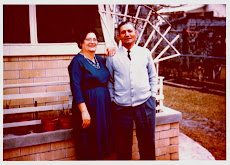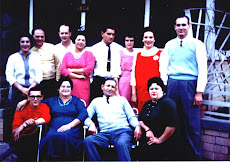If you hail from the Point, it doesn’t take long for someone to figure it out. Even if your last name doesn’t end with –ich or –eaux, the second you open your mouth, everyone knows your roots rest somewhere east of downtown.
This distinctive accent, largely native to the Point, but also heard around the Back Bay and other East Biloxi neighborhoods is less common in Central and West Biloxi. You definitely don't hear it in Long Beach, Gulfport or Pascagoula although you do hear something that sounds like it around Bay St. Louis.
It’s hard to describe the Point Cadet accent in print. Think Brooklyn crossed with a Southern drawl and you’re pretty close. A friend of mine from Massachusetts visiting East Biloxi for the first time declared, “I love this place. Everybody sounds like Joe Pesci.”
And, by the way, the true old timers never pronounced their neighborhood’s name as we do now. It was Point Caddy to them.
So how did this Noo Yawk accent wind up in the deepest part of the Deep South? And why did it largely skip over much of the rest of Mississippi’s coastal communities?
It all goes back to early 20th century immigration and its way of creating melting pots within a very short period of time. At the turn of the last century, New Orleans and Biloxi, received large numbers of people from Italy and what later became Yugoslavia, as well as Acadian French descendants from the swamps of South Louisiana. All of them were drawn by the booming seafood industry. New Orleans, more than Biloxi, also received Irish and German immigrants which explains why, in some neighborhoods, their regional accent is similar to, but slightly different than what you hear in some parts of Biloxi.
As the newcomers settled into the same working class neighborhoods, their various accents melded and evolved.
As evocative as these distinctive, if less than dulcet, tones are of our local culture, it’s hard to believe they they may be a short-lived phenomenon. The accent, so strong in my grandparents’ and parents’ generations, has started to fade away. Blame it on our transient society, where people move away from their old neighborhoods, and on the mass media which has affected all regional dialects to some degree.
In another generation or so , those dropped gs, screwy diphthongs and misplaced possessives may be heard only in oral history archives. A relic like the old downtown Biloxi Woolsworth (Woolworth’s to the rest of the world).
Aw, dawlin’, dey won’ know what dey missin’.
Red Bean Salad
The accent is on flavor in this favorite Point summer salad. This recipe does it the old-fashioned way, with red beans cooked from scratch, but today's busy cooks just substitute canned red beans..
1 cup of dried red beans
4 cups of water
(OR SUBSTITUTE 2-3 cans of red beans, rinsed well)
1 chopped onion
1/4 cup of good olive oil
1 T vinegar
Salt and pepper to taste
Rinse and sort beans. If cooking from scratch, bring beans and water to a boil and cook until tender. Drain well. Add chopped onion, olive oil, salt and pepper. Toss to blend. Refrigerate two hours and serve cold. This salad s a good accompaniment to grilled pork chops or sausage.
This distinctive accent, largely native to the Point, but also heard around the Back Bay and other East Biloxi neighborhoods is less common in Central and West Biloxi. You definitely don't hear it in Long Beach, Gulfport or Pascagoula although you do hear something that sounds like it around Bay St. Louis.
It’s hard to describe the Point Cadet accent in print. Think Brooklyn crossed with a Southern drawl and you’re pretty close. A friend of mine from Massachusetts visiting East Biloxi for the first time declared, “I love this place. Everybody sounds like Joe Pesci.”
And, by the way, the true old timers never pronounced their neighborhood’s name as we do now. It was Point Caddy to them.
So how did this Noo Yawk accent wind up in the deepest part of the Deep South? And why did it largely skip over much of the rest of Mississippi’s coastal communities?
It all goes back to early 20th century immigration and its way of creating melting pots within a very short period of time. At the turn of the last century, New Orleans and Biloxi, received large numbers of people from Italy and what later became Yugoslavia, as well as Acadian French descendants from the swamps of South Louisiana. All of them were drawn by the booming seafood industry. New Orleans, more than Biloxi, also received Irish and German immigrants which explains why, in some neighborhoods, their regional accent is similar to, but slightly different than what you hear in some parts of Biloxi.
As the newcomers settled into the same working class neighborhoods, their various accents melded and evolved.
As evocative as these distinctive, if less than dulcet, tones are of our local culture, it’s hard to believe they they may be a short-lived phenomenon. The accent, so strong in my grandparents’ and parents’ generations, has started to fade away. Blame it on our transient society, where people move away from their old neighborhoods, and on the mass media which has affected all regional dialects to some degree.
In another generation or so , those dropped gs, screwy diphthongs and misplaced possessives may be heard only in oral history archives. A relic like the old downtown Biloxi Woolsworth (Woolworth’s to the rest of the world).
Aw, dawlin’, dey won’ know what dey missin’.
Red Bean Salad
The accent is on flavor in this favorite Point summer salad. This recipe does it the old-fashioned way, with red beans cooked from scratch, but today's busy cooks just substitute canned red beans..
1 cup of dried red beans
4 cups of water
(OR SUBSTITUTE 2-3 cans of red beans, rinsed well)
1 chopped onion
1/4 cup of good olive oil
1 T vinegar
Salt and pepper to taste
Rinse and sort beans. If cooking from scratch, bring beans and water to a boil and cook until tender. Drain well. Add chopped onion, olive oil, salt and pepper. Toss to blend. Refrigerate two hours and serve cold. This salad s a good accompaniment to grilled pork chops or sausage.

